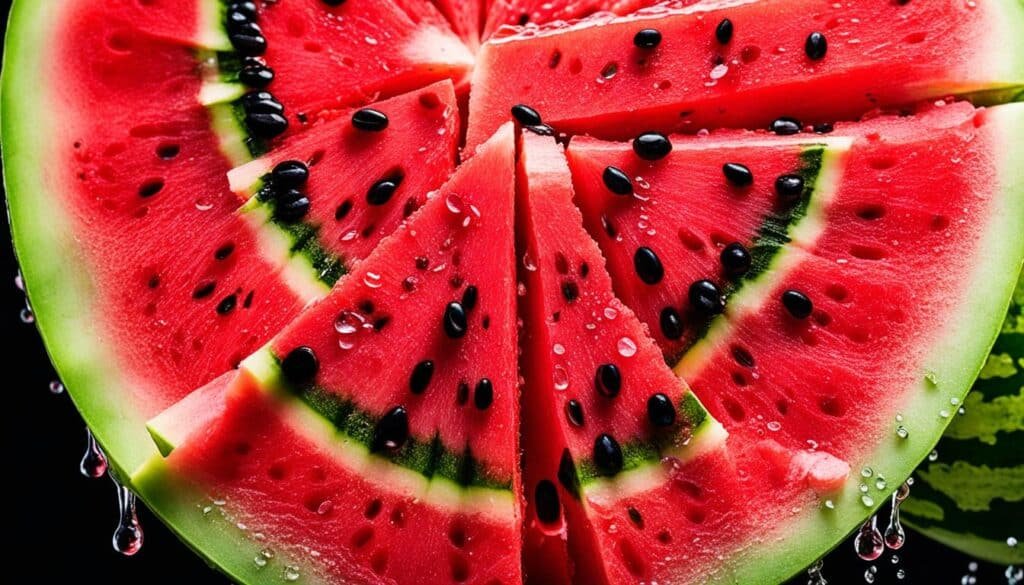Swollen arms, legs, or ankles can be signs of water retention. Maintaining a healthy balance of fluids is crucial for optimal health. Diuretics help eliminate excess fluids from the body. Natural diuretic drinks can be a prescription-free alternative to diuretic medications.
Key Takeaways
- Water retention can cause swelling and discomfort in the body.
- Natural diuretic drinks can help eliminate excess fluids without the need for prescription medication.
- Consulting with a dietitian can provide expert advice on the best natural diuretic drinks for your specific needs.
- Moderation is key when consuming beverages with diuretic effects, like caffeine-rich tea and coffee.
- Natural diuretic drinks can be incorporated into a balanced diet to promote fluid balance and overall well-being.
Understanding Diuretics and Their Effects
Diuretics play a vital role in managing water retention and restoring fluid balance in the body. These medications work by increasing urine production, helping to eliminate excess fluids and sodium. By reducing sodium absorption in the kidneys, diuretics contribute to increased water loss.
Water retention is a common condition characterized by the accumulation of fluid in tissues, leading to swelling in areas such as the arms, legs, or ankles. It can be caused by various factors, including hormonal changes, certain medications, and underlying medical conditions like heart or kidney disease.
Maintaining a healthy fluid balance is essential for the proper functioning of vital organs such as the heart, lungs, and kidneys. Diuretics can help alleviate the symptoms of water retention by promoting the excretion of excess fluids.
However, it is important to note that while diuretics can provide relief, they are not a cure for the underlying causes of water retention. It is crucial to address the root cause of water retention and work with healthcare professionals to develop a comprehensive treatment plan.
In the next section, we will explore the role of caffeine in diuretic drinks and its potential effects on fluid balance.
The Role of Caffeine in Diuretic Drinks
Caffeine, a natural diuretic, is commonly found in popular beverages like tea and coffee. This stimulant has the ability to increase urine production and promote fluid excretion. Caffeinated drinks, such as black and green tea, as well as coffee, can exhibit diuretic properties due to their caffeine content. However, it is essential to consume them in moderation to avoid the potential negative effects of excessive caffeine consumption.
Caffeine stimulates the kidneys, which in turn increases urine production. This diuretic effect can help eliminate excess fluids from the body, making it a desirable choice for individuals looking to manage water retention or promote fluid balance.
It is important to note that while caffeine can have diuretic properties, excessive consumption may lead to dehydration. It is recommended to balance caffeine intake with adequate hydration by also consuming non-caffeinated fluids, such as water.
Benefits of Caffeine in Diuretic Drinks
• Increased urine production: Caffeine stimulates the kidneys, leading to increased urine output and the elimination of excess fluids.
• Fluid excretion promotion: Caffeinated drinks, like tea and coffee, can help promote fluid excretion throughout the body.
• Natural diuretic alternative: Caffeine-based diuretic drinks provide a prescription-free option for individuals seeking to manage water retention.
To illustrate the caffeine content in different beverages, refer to the following table:
| Beverage | Caffeine Content (per 8 oz serving) |
|---|---|
| Black Tea | 14-61 mg |
| Green Tea | 24-40 mg |
| Coffee (brewed) | 95-200 mg |
Please note that the caffeine content can vary depending on various factors such as brewing method, brand, and serving size.

Remember, while caffeinated drinks can have diuretic effects, it is important to consume them in moderation and consider individual circumstances such as sensitivity to caffeine or existing health conditions. Consult a healthcare professional for personalized advice.
The Diuretic Benefits of Herbal Teas
Herbal teas are not only flavorful but can also offer diuretic effects, aiding in fluid excretion and promoting overall health. Three herbal teas known for their diuretic benefits are hibiscus, dandelion, and parsley.
Hibiscus Tea
Hibiscus tea has been shown to have diuretic properties, assisting in the elimination of excess fluids from the body. Additionally, studies suggest that hibiscus tea may have a blood pressure-lowering effect, making it a potential natural remedy for hypertension.
Dandelion Tea
Dandelion has a long history of use as a diuretic herb. Dandelion tea can aid in sodium balance and promote urine output, helping to reduce bloating and water retention. It is considered one of the gentlest diuretics and is commonly used for detoxification purposes.

Parsley Tea
Parsley, commonly used as a culinary herb, can also be prepared as a refreshing tea. Drinking parsley tea or adding fresh parsley to your meals may contribute to increased urine output. This herb is known for its potential diuretic effect, along with its nutritional benefits.
“The diuretic properties of herbal teas like hibiscus, dandelion, and parsley can support healthy fluid balance and assist in the elimination of excess fluids from the body.”
To better understand the diuretic benefits of herbal teas, let’s take a closer look at these three herbs:
| Herbal Tea | Diuretic Effects | Additional Benefits |
|---|---|---|
| Hibiscus Tea | Aids in fluid excretion and may lower blood pressure | Rich in antioxidants and may support heart health |
| Dandelion Tea | Assists in sodium balance and promotes urine output | May have liver-protective properties and aid in digestion |
| Parsley Tea | Contributes to increased urine output | High in vitamin C and other essential nutrients |
While herbal teas can be a beneficial addition to your routine, it is important to remember that individual responses may vary. If you have any underlying medical conditions or take medications, it is always recommended to consult with a healthcare professional before incorporating herbal teas or any diuretic remedies into your diet.
Continue reading to explore the hydrating and diuretic properties of watermelon in the next section.
The Hydrating and Diuretic Properties of Watermelon
Watermelon is a refreshing fruit that not only quenches your thirst but also provides numerous health benefits. With its high water content of approximately 92%, watermelon is an excellent choice for staying hydrated.

In addition to its hydrating properties, watermelon is also known for its diuretic effect, helping to eliminate excess fluids from the body. The diuretic effect of watermelon can be attributed to its natural compounds, including citrulline and potassium.
Citrulline, an amino acid found in watermelon, helps in the production of nitric oxide, which relaxes blood vessels and promotes healthy blood flow. Potassium, on the other hand, regulates fluid balance in the body, aiding in efficient water elimination through urine.
Furthermore, watermelon is packed with essential vitamins, such as vitamin A and vitamin C, which support overall health and strengthen the immune system. The antioxidant properties of watermelon help protect cells from damage caused by free radicals, reducing the risk of chronic diseases.
To make the most of watermelon’s hydrating and diuretic properties, enjoy it as a refreshing snack or incorporate it into fruit salads, smoothies, or infused water. Remember, watermelon is not only a delicious and hydrating treat but also a natural way to support your body’s fluid balance and promote healthy hydration.
The Nutritional Benefits of Celery
Celery is a crunchy vegetable that offers numerous nutritional benefits. With its high water content and essential minerals like potassium, celery is not only refreshing but also contributes to a balanced diet. While celery has traditionally been used as a diuretic, its diuretic potential requires further research to be fully understood and confirmed.
However, what we do know is that celery contains active compounds that may help reduce blood pressure, making it a potentially valuable addition to a healthy lifestyle. Additionally, celery is low in calories and high in fiber, making it an excellent choice for those looking to manage their weight or improve digestion.
Also Read:- How To Pick The Healthiest Energy Drink: Tips & Tricks
To further explore the nutritional benefits and potential diuretic effects of celery, research studies are being conducted. These studies aim to investigate how celery may impact fluid balance and promote the elimination of excess fluids from the body. Until comprehensive research is available, it is best to view celery as a nutritious vegetable that can be part of a well-rounded diet.
“Its diuretic potential needs further research, but it can be a healthy addition to a balanced diet.”
The Nutritional Profile of Celery
Before delving deeper into the potential diuretic effects of celery, let’s take a look at its impressive nutritional profile:
| Nutrient | Amount per 100g |
|---|---|
| Calories | 16 |
| Water | 95% |
| Carbohydrates | 3g |
| Fiber | 1.6g |
| Potassium | 260mg |
| Vitamin K | 29mcg |
| Vitamin C | 3mg |
As seen from the table above, celery is low in calories but rich in water and fiber. It is also a good source of potassium, which plays a vital role in electrolyte balance and fluid regulation within the body. Additionally, celery contains vitamin K and vitamin C, both of which support various aspects of overall health.
While celery’s diuretic potential continues to be explored, it is clear that this vegetable offers a range of nutritional benefits that can contribute to a healthy and well-balanced diet.
The Potential Diuretic Effects of Coconut Water
Coconut water is a refreshing and hydrating beverage that not only quenches your thirst but also offers potential diuretic effects. Known for its natural electrolyte balance, coconut water can help maintain fluid balance in the body.
Studies suggest that coconut water may have diuretic properties by increasing the excretion of sodium and chloride through urine. This can help reduce water retention and promote optimal fluid balance.
Furthermore, coconut water contains antioxidants and nutrients that support overall health and well-being. It is rich in potassium, magnesium, and calcium, which are essential electrolytes that help regulate fluid levels in the body.
Coconut water may also have a beneficial impact on the hormones responsible for fluid and electrolyte balance. By suppressing these hormones, coconut water can potentially increase diuresis and promote the elimination of excess fluids.
Incorporating coconut water into your regular hydration routine may contribute to maintaining healthy fluid balance and supporting the body’s natural diuresis process.

Natural Diuretics in Fruits and Vegetables
When it comes to managing water retention and promoting fluid balance, several fruits and vegetables stand out for their natural diuretic properties. Incorporating these nutrient-rich options into your diet can help support healthy fluid levels and potentially promote diuresis.
Here are some fruits and vegetables known for their diuretic effects:
| Fruits | Vegetables |
|---|---|
| Bananas | Brussels Sprouts |
| Avocados | Pineapples |
| Cantaloupes | Beets |
| Pineapples | Spinach |
| Oranges |
These fruits and vegetables contain essential nutrients like potassium and/or magnesium, which are known to play a role in fluid balance. Potassium, in particular, helps regulate sodium levels in the body, reducing water retention and promoting diuresis.
Incorporating a variety of these diuretic fruits and vegetables into your meals and snacks can provide a natural way to maintain optimal fluid balance and support overall health. Remember to consult with a healthcare professional or registered dietitian for personalized advice.

The Mild Diuretic Effects of Hawthorn and Parsley
When it comes to natural diuretics, Hawthorn and Parsley are two plants that have gained attention for their potential diuretic effects. While their diuretic properties are considered mild, they offer promising benefits for those looking to manage water retention and improve fluid balance.
Hawthorn, a flowering plant commonly found in North America, Europe, and Asia, has been the subject of several studies investigating its diuretic effects. Research suggests that Hawthorn may aid in improving symptoms of heart failure and increasing fluid excretion through its diuretic properties. However, it is important to note that further research is needed to fully understand the mechanisms and effectiveness of Hawthorn as a diuretic.
Parsley, commonly used as a culinary herb, contains compounds that may contribute to its mild diuretic effect. While it is often known for its flavor and garnishing purposes, Parsley has shown potential in increasing urine output and promoting fluid excretion. However, more research is required to establish the extent of its diuretic effects and optimal consumption methods.
Incorporating Hawthorn and Parsley into your diet in moderation may offer mild diuretic benefits. Consult with a healthcare professional before using any herbal remedies, especially if you have underlying medical conditions or take medications.
Summary:
– Hawthorn and Parsley are natural plants that possess mild diuretic effects.
– Hawthorn may improve symptoms of heart failure and aid in fluid excretion.
– Parsley has compounds that promote urine output and fluid excretion.
– Further research is needed to fully understand the diuretic properties of Hawthorn and Parsley.
– Always consult with a healthcare professional before incorporating herbal remedies into your diet.
The Potency of Tea and Coffee as Natural Diuretics
When it comes to natural diuretics, black tea, green tea, and coffee are popular choices thanks to their diuretic properties. These beverages contain caffeine, a stimulant known for its ability to increase urine production and promote fluid excretion.
Caffeine acts as a diuretic by inhibiting the reabsorption of water in the kidneys, resulting in increased urine output. By encouraging the elimination of excess fluids, black tea, green tea, and coffee can help alleviate symptoms of water retention and support fluid balance.
However, it’s important to consume these beverages in moderation. While the diuretic effect of caffeine can be beneficial, excessive consumption can lead to dehydration and other negative effects. It’s recommended to limit caffeine intake to moderate levels, which is typically around 200-300 milligrams per day for most adults.
Here are the approximate amounts of caffeine found in standard servings of these beverages:
| Beverage | Caffeine Content |
|---|---|
| Black Tea (8 oz) | 40-70 mg |
| Green Tea (8 oz) | 20-45 mg |
| Coffee (8 oz) | 95-165 mg |
As you can see, coffee generally contains more caffeine than black or green tea. It’s important to consider individual sensitivity to caffeine and adjust intake accordingly.
Remember to balance the diuretic properties of these beverages with adequate hydration. While they can help eliminate excess fluids, it’s still essential to maintain a healthy fluid balance by drinking water and other non-caffeinated fluids throughout the day.
In conclusion, black tea, green tea, and coffee can be potent natural diuretics due to their caffeine content. They can help increase urine production and promote fluid excretion. However, it’s crucial to consume these beverages in moderation and consider individual caffeine sensitivity for optimal health benefits.
The Safety and Risks of Natural Diuretics
Natural diuretics are a popular choice for managing water retention and promoting fluid balance. While they are generally considered safe, it’s important to be aware of the potential risks associated with their use. Due to limited research, the effects of natural diuretics can be unpredictable, making it crucial to approach their usage with caution.
If you are considering incorporating natural diuretics into your routine, it is strongly recommended to consult with a healthcare professional beforehand. This is especially important if you have underlying medical conditions or if you are taking medications that may interact with diuretics. Your healthcare provider can provide personalized guidance and ensure that diuretics are a safe choice for you.
Overuse or misuse of diuretics can disrupt fluid and electrolyte balances in the body, leading to adverse effects. It is crucial to follow recommended dosage guidelines and not exceed the suggested intake. Additionally, it’s important to monitor your body’s response to diuretics and discontinue use if you experience any concerning symptoms.
“Before incorporating natural diuretics into your routine, it is advisable to seek professional advice to ensure their safe and appropriate usage.”
By exercising caution and seeking professional guidance, you can minimize the potential risks and optimize the benefits of natural diuretics. Remember, when it comes to your health, it’s always better to be safe than sorry.
Potential Risks of Natural Diuretics:
- Electrolyte imbalances
- Dehydration
- Lowered blood pressure
- Increased urinary frequency
| Natural Diuretic | Potential Risks |
|---|---|
| Hibiscus | None reported |
| Dandelion | Allergic reactions, gastrointestinal upset |
| Parsley | None reported |
| Watermelon | None reported |
It’s important to note that these risks may vary depending on the specific natural diuretic being used and individual factors such as medical history, medications, and overall health. Consulting with a healthcare professional will help identify any specific risks or interactions that may apply to your situation.
Ultimately, while natural diuretics can offer a prescription-free alternative to traditional diuretic medications, their safety and efficacy should always be evaluated on an individual basis. By prioritizing safety and informed decision-making, you can make the most of natural diuretics and support your overall health and well-being.
Conclusion
Natural diuretic drinks provide a valuable solution for managing water retention and promoting fluid balance. These drinks offer a safe and prescription-free alternative to diuretic medications, allowing individuals to incorporate them into a healthy, balanced diet.
However, it is important to consume natural diuretic drinks in moderation to avoid any potential negative effects. Consulting with a healthcare professional can provide personalized guidance and ensure these drinks are used safely and effectively.
In summary, natural diuretic drinks can be a beneficial addition to your overall wellness routine. They can help alleviate symptoms of water retention and contribute to maintaining proper fluid balance. Remember to exercise caution, drink responsibly, and seek professional advice for optimal results.
FAQs
Q: What are natural diuretic drinks?
A: Natural diuretic drinks are beverages that help the body get rid of excess water by increasing the frequency of urination. They can include specific teas, infused waters, and certain fruit juices.
Q: How do natural diuretic drinks work?
A: Diuretic drinks contain substances that increase the amount of urine produced by the body, thus helping to reduce fluid retention and rid the body of excess water, potentially benefiting those dealing with high blood pressure or edema.
Q: Which teas are considered natural diuretics?
A: Green and black teas are considered to have diuretic properties, as they can increase the frequency of urination and help the body get rid of excess water.
Q: Can drinking enough water reduce fluid retention?
A: Yes, drinking enough water can actually help reduce fluid retention in the body. It may seem counterintuitive, but ensuring proper hydration can aid in flushing out excess sodium and water from the body.
Q: What are the best natural diuretics for reducing fluid retention?
A: Some of the best natural diuretics for reducing fluid retention include green and black tea, as well as certain fruits and vegetables high in water content, such as watermelon and cucumber.
Q: Do natural diuretic drinks have any potential side effects?
A: While natural diuretic drinks can be effective in reducing water weight and fluid retention, it’s important to consume them in moderation as excessive diuretic effects may lead to dehydration and electrolyte imbalance.
Q: Are there supplements available that act as natural diuretics?
A: Yes, there are natural supplements that have diuretic properties and can be used as a way to increase the body’s removal of excess water. However, it’s important to consult with a healthcare professional before using any diuretic supplements, especially if you have underlying health conditions.





